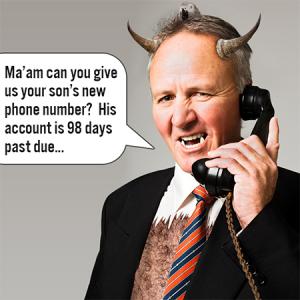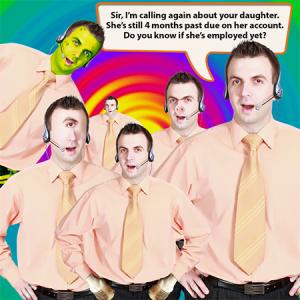Phone Harassment
Privacy is hard to find in today’s world of auto dialed calls, prerecorded computerized messages, and other telephone harassment. Debt collectors, credit card companies, service providers and/or telemarketers hit us up in the morning, while we are at work or with company, and when we are otherwise busy. You know you don’t enjoy these annoying calls , but did you know you can get paid for them?
There are ways to stop collection calls, robodialed calls, telemarketing calls and other annoying telephone harassment. But exactly what to do if a debt collector calls, how to stop collection calls and how to stop harassing phone calls of any sort generally depend on several different factors. These include who’s calling you, how they’re dialing you and where you are when they call. And when these harassing call laws are violated, you can be entitled to a money award.
Can collection call laws stop harassing phone calls?
How to stop harassing collection calls can vary. For example, the Fair Debt Collection Practices Act provides several ways to stop debt collector calls. But, you may not be able to use the FDCPA’s “stop calling” provisions to stop harassing collection calls from original creditors. That’s when you need to pivot to the Telephone Consumer Protection Act and its collection call rules and other provisions on phone harassment by these companies and their auto-dialers.
Similarly, stopping collection calls at home may require you to send the collector a “stop calling letter” but you may be able to orally cease bill collectors calling at work. And if these contacts are made to your cell phone, the collector or telemarketer may have violated the TCPA if they called using an artificial or prerecorded voice.
No matter, sending a stop collection calls letter or other letter to stop collection calls while you dispute the debt, or using the FDCPA’s collection call laws on attorney representation, or the TCPAs revocation of consent rules, can often stop harassing debt collection phone calls. And harassing phone calls from debt collectors and other businesses can violate your rights and net you a cash award.

How can you stop debt collectors from calling?
Debt collectors calling and other inconvenient calls to your cell phone or home phone/landline invade your privacy. The most effective and immediate way to stop collection calls entirely is to use the FDCPA’s rule on ceasing communications. The FDCPA states if you notify the collector in writing that you either refuse to pay the debt, or that you just want the debt collector to cease further communication with you, the collector must stop communicating with you with respect to the debt.
Send a copy of the letter certified (and take a picture of the letter and the receipt). And although though you only have thirty days from receipt of the initial communication to dispute the debt, you can send this cease and desist letter anytime.
Are debt collectors allowed to leave messages on a cell phone or landline?
Bill collectors and creditors collecting their own debts have strict requirements to meet when they leave voice messages on personal answering machines. The message needs to make certain specific disclosures and cannot leave comments such as “it’s urgent” or make misrepresentations about the nature of the call.
For instance, “This is Mr. Collector with Default collections. I’m calling about your overdue credit card payment. It’s urgent that you return my call today so we can discuss bringing your account current. My phone number is 555-1234” VIOLATES THE LAW for several reasons, and can cause actual damages if others overhear the message.

Calling several times a day to leave a message (on a machine or with a person other than you or your spouse) will also likely violate the FDCPA. If collectors call and actually speak with you or your spouse then calling again that day without a legitimate purpose might be considered harassment as well.
Leaving threatening or abusive messages including abusive language, religious slurs, profanity, obscenity, calling the consumer a liar or a deadbeat, or other name calling, threatening legal action that they do not intend to take and the use of racial or sexual epithets are serious violations of the FDCPA.
Can you stop collection calls at work?
Debt collectors calling at work is often illegal. Collectors should only call someone other than you at work to verify your employment. Discussing your debt or any other personal information is illegal!
If your employer objects to collectors calling the workplace, either you or your employer must inform collectors of the “no call policy.” This can be verbal or in writing (the FDCPA supports verbal notification on this issue). Once informed any additional calls to your work place violates the FDCPA and opens the collector up to a lawsuit.
Apart, the collector also should not call your workplace to begin with if he or she has reason to know such calls are inconvenient.

Can debt collectors leave messages on work voice mails?
Debt collectors can call you at work unless you or your employer have told them otherwise so. Collectors who continue calling your work after being told to stop are violating the FDCPA.
If you have a private phone at work that only you answer and collectors know the number it is the only number they can legally use to call you at work. Calling any other number is designed to embarrass you and violates the FDCPA. If your private phone has a private voice mail feature collectors can leave messages but the same rules about the type of message and content as outlined above still apply.
If you use a phone at work that can be accessed by anyone else it’s considered a public use phone. Collectors must be very careful about the type of message they leave on public use phones. They can leave a message but the only thing the message should include is the collector’s name and number. NO reference to the debt is allowed and any hint that the call is about the collection of a debt is illegal.
When are bill collectors not allowed to call?
People often wonder can debt collectors call on Sunday and other questions about the timing of collection calls. Unless you give debt collectors permission to do otherwise, they can only contact presumptively you under specific conditions and during certain times of the day. This includes but is not limited to:
- never calling you before 8 a.m. or after 9 p.m. your time;
- not contacting you at any other unusual time or place or time, or at a place or time known or which should be known to be inconvenient to you;
- not calling you at work if your employer disapproves and you/a co-worker/your employer informs them, or they had other reason to know would be inconvenient to you; and,
- If you have sent a do not call letter.
These callers and their collection call scripts are great at skirting the boundaries. If you point out that it’s not a good time to talk provide a time when they can call back. If they ignore you and keep pressing their demand for payment they are quickly moving toward illegal behavior.

Can debt collectors keep calling?
Collectors cannot continuously call you. Section 1692c(5) prohibits contacting the consumer by telephone “repeatedly or continuously with intent to annoy, abuse, or harass any person at the called number.”
Continuously means making a series of telephone calls one right after the other and “repeatedly” can mean calling with excessive frequency under the circumstances. So if they’ve already called you today they probably shouldn’t call again. Similarly, a call campaign shouldn’t run for so many days or calls total as to be considered harassing or inconvenient.
From your point of view, calling on Sunday morning or in the middle of a holiday dinner may be inconvenient. But not all collectors agree and some have perfected the art of timing their calls for the most inconvenient time.
How do you stop harassing phone calls from creditors?
Calls from original creditors are usually exempted from the FDCPA’s reach. Although there are a few state fair debt laws that cover this situation, the most effective tool to stop creditor harassment may be the federal Robocall Law, the Telephone Consumer Protection Act.
The Telephone Consumer Protection Act is a federal law that makes it illegal for any person or any company to use an artificial or prerecorded voice to contact you without your prior express consent. These include debt collection communications from original creditors, as well as telemarketing calls. This law can award you damages of between $500 and $1,500 per call/text against anyone who violates your right to privacy with these annoying robotized messages and texts without “prior express consent.”
If you have not given your permission (such as when applying for a loan or in a conversation with them), your TCPA rights may be violated if:
- they call your cell phone using an auto-dialer;
- call your cell phone and use a pre-recorded voice;
- auto-dial your residential phone to deliver certain types of telemarketing calls;
- call your residential line using a pre-recorded voice with certain types of telemarketing calls; or
- send a junk fax to your fax machine without properly identifying themselves and their number.
The TCPA also applies to wrong party calls from collectors or creditors, telemarketers and anyone else.
What if debt collectors are calling the wrong person?
Sometimes collectors call the wrong person: you looking for someone else, or someone else looking for you. If you receive calls from collectors looking for someone who lived in the house or apartment before you, had the phone number you have now, or the person’s name is the same or similar to yours, your rights under the FDCPA, TCPA and/or state fair debt laws may be violated.
Do not take their harassment! Tape the calls and tell the caller that you are doing so for evidence of their illegal behavior and that you intend to file a complaint. Then, contact a consumer protection lawyer or your State Attorney General’s consumer protection division, or the CFPB.
If you believe there is a mistaken identity start thinking IDENTITY FRAUD and take action to protect your credit reports. Tell the collector you believe this might be fraud or ID theft. If the debt might be yours then act in good faith and tell the collector so. Remember you still have the right to dispute the debt if, even after discussing it, you believe it to be invalid.
Can debt collectors call other people about a debt?

Unless you consent, a court order or section 1692b permits, “or as reasonably necessary to effectuate a post-judgment judicial remedy,” debt collectors “may not communicate, in connection with the collection of any debt, with any person other than you, your attorney, a consumer reporting agency if otherwise permitted by law, your creditor, the attorney of the creditor, and the attorney of the debt collector.”
Collectors are allowed to call third parties to verify location information. This means they can call your family, friends, neighbors and employer. However, the FDCPA strictly limits the information they reveal and the questions they can ask with regard to debt collectors calling relatives and other third parties.
When contacting third parties they must identify themselves but may not state that you owe any debt. They can say that they are confirming or correcting information they have about your location, address, phone number, and/or employer, only. And (only) if expressly requested to do so can they identify who they work for. But revealing who they work for does not mean they can discuss your debt.
Debt collectors may not call third parties under the pretense of gaining information already in their possession. Calling your family, friends, neighbors, employees, employer, etc. after they already have your phone number is a serious violation of the FDCPA and should be reported immediately. Also collectors clearly violate the FDCPA when they call these people more than once or call them after they already have your location information.
The only legal reason for calling neighbors (or any third party) is to locate you. If collectors already have your location information the only possible reason for calling third parties is to embarrass you, a clear violation of the FDCPA that should be reported.
How can you stop telemarketing calls?
Another annoyance autodialers and predictive dialers produce are telemarketing calls. Your landline and wireless phone numbers are easy to find thanks to public records, making these numbers easy prey for telemarketers and other solicitors. These devices store and dial telephone numbers in a random or sequential number order. When you answer the phone, you hear a computerized or pre-recorded voice .
The TCPA protects you in this situation. The calls are illegal without prior express consent, and that may be revoked or naturally expire. Additionally, the National Do-Not Call List prohibits solicitation calls from contacting registered numbers. The list works for personal landline and wireless numbers. The federal do not call registry allows telephone subscribers to sue for telephone advertising calls (telemarketing calls) only if the phone subscriber is registered on the do not call list and the caller violates the do not call list by calling a number listed on the do not call registry at least twice during a 365 day period.








